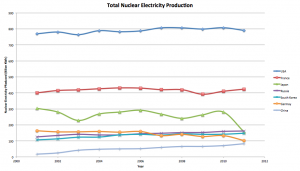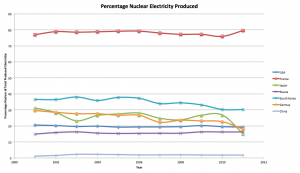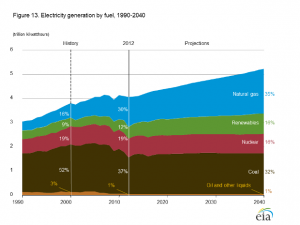Current Energy
Nuclear energy is used around the by countries around the world. 11.9% of electricity worldwide is supplied by nuclear power.
There are currently 436 reactors in use worldwide; 100 of these reactors are in the US. The most used type of reactor is a Pressurized Water Reactor. As of 2012, there were 271 Pressurized Water Reactors commercially operating worldwide. The Second most utilized type of reactor is a Boiling Water Reactor. There are 84 of these reactors in use worldwide. Both Pressurized Water Reactors and Boiling Water Reactors are light water reactors. Pressurized Heavy Water Reactors, Gas-Cooled Reactors, and Fast Neutron Reactors all use something other than water (H2O) as a coolant, and are thus not considered light water reactors .
Source: http://www.world-nuclear.org/info/nuclear-fuel-cycle/power-reactors/nuclear-power-reactors/
Currently, four countries use Fast Neutron Reactors: India, Russia, China, and Japan. However, only Russia uses it’s Fast Neutron Reactor for commercial operation. Countries that have used these reactors in the past include: the US, the UK, France, and Germany.
Source: http://www.world-nuclear.org/info/Current-and-Future-Generation/Fast-Neutron-Reactors/
Below is a plot of total electricity produced by nuclear power. This plot shows how much electricity was produced by the top seven nuclear power producers.

Source: EIA
As shown, the United States produces far more electricity by nuclear power than other top producers. However, the United States produces more overall electricity than most other countries. Below is a figure depicting the percentage of electricity produced by nuclear power in each country.

Source: EIA
Source: http://www.eia.gov/cfapps/ipdbproject/IEDIndex3.cfm?tid=2&pid=2&aid=12
The United States produces a smaller percentage of its electricity from Nuclear Power than France and South Korea. Notice the decline in Japanese Nuclear Electricity production between 2010 and 2011. This is because of the Fukushima Daiichi plant failures. The failure of these plants lead to scrutiny of nuclear plants nationwide.
Potential Energy
Uranium, the fuel of Nuclear Power, is a plentiful resource. There are estimated to be 3 x 106 metric tonnes of accessible Uranium in the US and 17.6 x 106 metric tonnes of accessible Uranium in the World. That is enough Uranium to fuel the entire world’s electricity consumption for 990 years using nuclear breeder reactors. Using light water reactors at current world nuclear power production rates, the world could continue supplying nuclear energy for 306 years.
Though Nuclear Power has resource potential to power the future, it is not expected to grow relative to other fossil fuel energy sources. Below is a plot of the EIA projected electricity generation by fuel. While Natural Gas and Renewables grow, Nuclear loses its market share from 19% to 16%. This is because of economic and political barriers.

Source: EIA
Source: Energy and the Environment (2nd Ed.), http://www.washingtonpost.com/blogs/post-partisan/wp/2013/12/18/why-environmentalists-should-hope-nuclear-power-sticks-around/
Works Cited
- “Fast Neutron Reactors.” World Nuclear Association. N.p., Jan. 2014. Web.
- “International Energy Statistics.” International Energy Statistics. U.S. Energy Information Administration, 2012. Web.
- “Nuclear Power Reactors.” Nuclear Reactors. World Nuclear Association, Nov. 2013. Web.
- Ristinen, Robert A., and Jack J. Kraushaar. “Chapter 6: The Promise and Problems of Nuclear Energy.” Energy and the Environment (2nd Edition). New York: Wiley, 2006. N. pag. Print.
- Stromberg, Stephen. “Why Environmentalists Should Hope Nuclear Power Sticks around.” Washington Post. The Washington Post, 18 Dec. 2013. Web.
Primary author: Zachary Lappen
Editor: Team